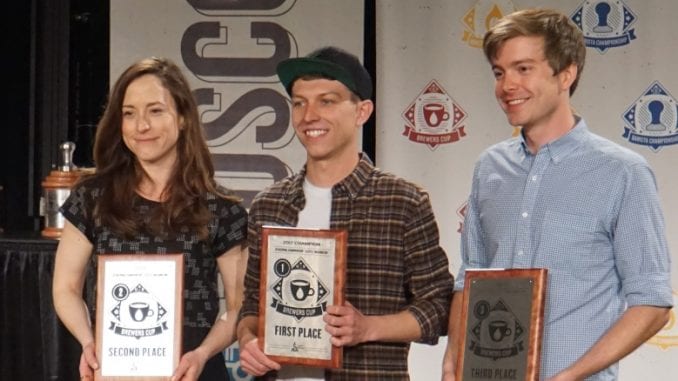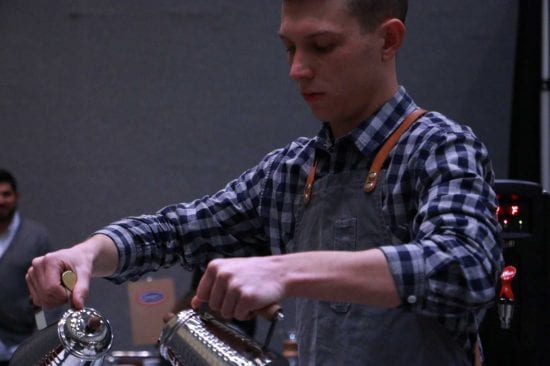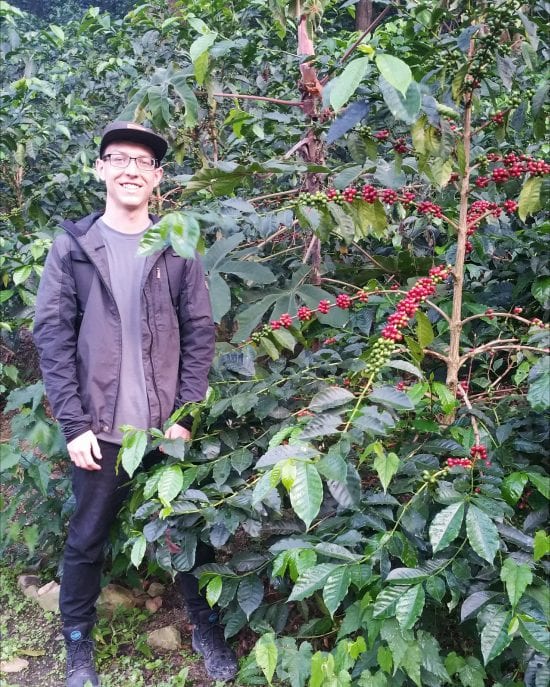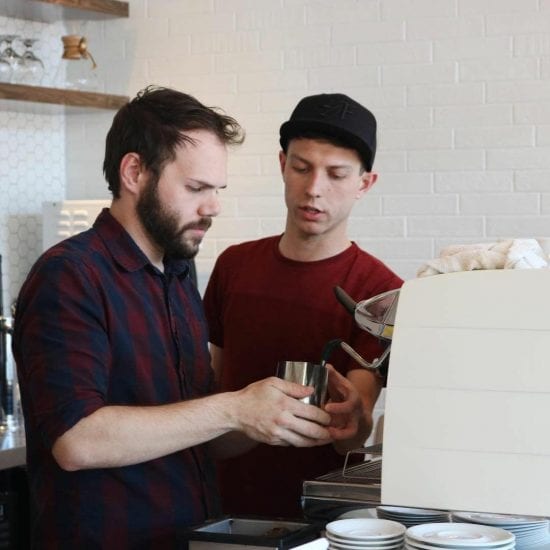
Last month, the United States Coffee Championships took place in Seattle, and we crowned four new champions. Over the next four days, we’ll talk to each champion about their road to victory.
BY ASHLEY RODRIGUEZ
BARISTA MAGAZINE ONLINE
This is the second in a four part series. Read our interview of USBC winner Kyle Ramage here and of roasting champion Mark Michaelson here.
Dylan Siemens is part of the powerhouse that Onyx Coffee Lab sent to the United States Coffee Championships. Much like his roasting champion counterpart, Mark Michaelson, most of Dylan’s coffee experience comes from Onyx—first as a customer at the yet-to-be-called Onyx cafe, then as a barista when he was 19.
Now he’s the trainer for Onyx, and he used his training experience to craft a presentation focusing on developing a language and procedures for manual brewing. For his open service, Dylan used the same coffee that Mark roasted with and Andrea competed with in the USBC—a green-tip Colombia Gesha from La Palma y El Tucan in Colombia—and focused on controlling the brew-bed temperature. Below we talk to him about his pathway to coffee, his training regimen, and his hopes for the future of coffee.

AR: How did you first start working in coffee? What were you doing before?
DS: I’ve wanted to be a barista since my sophomore year of high school, when I started going to a coffee shop down the street from my high school. Andrea Allen served me almost every day at that shop. She, along with her husband, Jon, owned that shop under another company at that time. I asked for a job multiple times, but I was too young for them to hire. I left for college, tried to work at other cafes, and moved home after I decided to change majors. By the end of my first year of college, though, I finally got a job as a barista under Jon and Andrea.
Right after I began working, they rebranded the shop to Onyx Coffee Lab, and started serving coffee that Jon was sourcing and roasting. I was 19 years old, so that was about five years ago. I pretty much fell into a new company without knowing much of what their vision was, got hooked, and have been with them ever since. A year and a half after starting, they asked me to be a full-time trainer, so I dropped out of community college straight away to start training.

AR: What was your first ‘a-ha’ moment in coffee?
DS: The one day that really stands out was a snow day. I lived close to the shop, so I went and opened up by myself and served a few people. Andrea came in, and she started to work me on espresso for hours. She had me dial-in so many coffee blends and single origins that I’d never had on espresso, searching for the perfect shot. I didn’t realize it in the moment, but she was teaching me everything about how coffee works: ratios, extraction, technique, flavor, and how it all connected. I tasted countless shots, most of them terrible. It was the most over-caffeinated I have ever been to this day. That was definitely the day that I ‘got it’ and fell in love with all aspects of coffee. Andrea inspired me, pushed me, and has definitely taught me everything I know in terms of coffee fundamentals. She transmitted her love of coffee to me.
AR: Tell us about training for competition. How did you approach it? What were the key moments for you to practice and figure out?
DS: Competition training is my excuse to experiment with all the ideas I have about making coffee the ‘best’ way. I’m a trainer, so my practices and routines are always centered around technicality, learning something new, and presenting it to a panel of objective professionals. Before regionals, I was working with a range of coffee-to-water ratios, grind distribution, agitation, and temperature. One night, I decided to look in-depth at temperature. I boiled water and took butane torches to Kalitas and brewed with boiling water. Then I’d chill Kalitas, and brew with cool water without wetting the filter. I experimented with maintaining different bed depths.
AR: What was your Brewers Cup presentation about?
DS: My theme is all about discovering better ways to discuss how we brew coffee in our manual brews. Espresso has fairly standardized procedures and language, but brewing doesn’t. Controlling bed temperature seems like one accessible variable that can help anyone dial in their coffee more accurately, and it’s easy to share that information. In an industry where automation is growing, I think it’s the ability to manipulate flavor with our hands that makes Brewers Cup important.

AR: Training can be both exhausting and rewarding. What do you like about it? What have you struggled with in the past?
DS: Training can definitely be hard, but teaching is something I’ve always wanted to do. I like teaching because it requires me to really know and be sure of what we’re doing in our stores. The reward is watching somebody become really great at something, and getting to know that person. Helping somebody become confident in their own abilities, and to rediscover things with our baristas, can be tiring, but it never gets old because it’s too much fun. The hardest part was to first become confident in my own abilities, and then to develop a program that works. I don’t think the system and way that I teach will ever be ‘complete.’
AR: How has training for competition changed the way you approach coffee?
DS: I think my approach changes every time I compete in anything. But that’s one of my favorite parts about competing. The way I manually brewed last year to this year has changed pretty drastically. Mostly, I used to force the coffee to work a certain way, meaning I’d try to fit every coffee into a ‘parameter.’ Now I’m much more receptive to discovering what a given coffee needs to have happen in order to make it taste good. Less parameters, more feeling and taste, I guess. I’m less worried about brew time and TDS, and more focused on bed depth, bed temperature, agitation, pouring pattern, and how all those smaller non-recipe-related variables influence the subtleties of flavor. Everything is about discovering the possible levels of acidity, sweetness, and body, and changing my brewing technique to maximize those. This has forced my training to evolve, but I think it’s for the better.

AR: What in coffee feels important to you? What do you want to see happen in the industry? What are you excited about?
DS: People are the heart of this industry, and specialty coffee is all about service. I hope to see that ideal grow and unify all parts of the chain. It’s exciting to see more interest given to specialty coffee, and hopefully that enables the amount of production to grow at origin. As that happens, quality of life becomes better for everyone, from the producer to the barista, and therefore, service to one another is more realized. I think there is also a massive amount of interest being put into the science and education side of specialty coffee. As a trainer, I think that’s extremely valuable and exciting. I’m hoping to see research turn into open-source knowledge for every part of the specialty chain. We’re at a big turning point in the industry and the world as a whole, and I think the people of specialty coffee can do a great deal of good. It’s awesome to be a part of a passionate community at this point in time.

